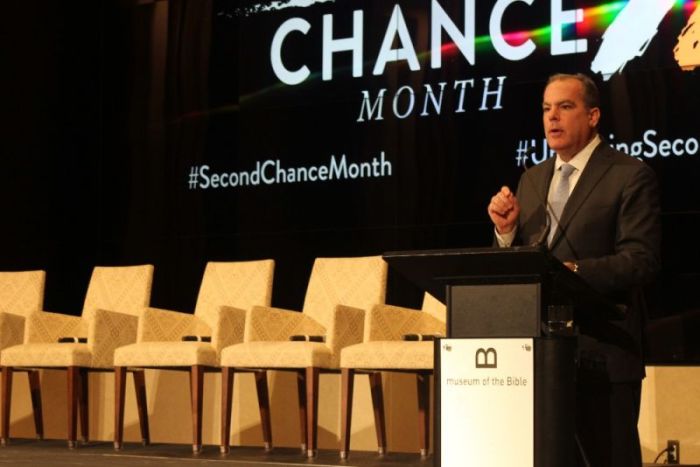Prison Fellowship CEO: Trump's Death Penalty for Drug Dealers Plan 'Doesn't Make Any Sense'

WASHINGTON — Prison Fellowship President James Ackerman has voiced concern with President Donald Trump's new plan to impose the death penalty on drug traffickers when it is appropriate to do so under current law.
After Trump officially rolled out on Monday a three-part plan to tackle the opioid epidemic that includes a call for capital punishment for certain drug traffickers considered to be "big pushers," a number of critics have railed against the idea.
Included among the critics is Ackerman, who has been among evangelical leaders involved in meetings with senior Trump White House staff on criminal justice reform in the past year.
"It doesn't make any sense to me at all, to be perfectly frank," Ackerman told The Christian Post Monday night following Prison Fellowship's bipartisan panel discussion on prison re-entry reform held at the Museum of the Bible.
Ackerman, who worked for years as an entertainment executive and was selected in 2016 to serve as the head of the national evangelical prison ministry founded by Chuck Colson, argued that executing drug dealers would be similar to punishing gun manufacturers for the murders committed by those who buy the guns.
"You cannot convict, unless the drugs themselves are laced with something that caused murder," Ackerman explained. "You cannot convict somebody's misuse of drugs that they purchased in an illegal market."
Although Ackerman believes that courts should judge drug dealers by the nature and amount of the drugs they sell, the idea of sentencing traffickers to death is a bit extreme to him.
"The death penalty being issued for people who are dealers of drugs makes no sense to me," Ackerman said.
CNN on Tuesday quoted senior White House officials as saying that the administration will not be waiting for Congress to propose legislation on the death penalty and that the Justice Department is already "examining to move ahead with [the plan] to make sure that's done appropriately."
Although the official declined to give an example of situations in which death penalty could be sought in drug trafficking cases, the official explained that there are obvious "instances where that would be appropriate."
The White House proposal is an attempt to curb the ongoing opioid epidemic, which has taken the lives of more than 500,000 people since 2000 and 64,000 in 2016, according to the U.S. Centers for Disease Control and Prevention.
"We can't execute our way out of this epidemic," Dr. Andrew Kolodny, co-director of the Opioid Policy Research Collaborative at Brandeis University, told CNN. "To be talking about the death penalty sounds to me like a step backwards."
In an op-ed, Jonathan Groner, a pediatric surgeon and professor at the Ohio State University College of Medicine, argued the sentencing drug dealers to the death penalty is expensive and nothing more than a "cruel distraction from the opioid crisis."
"The opioid epidemic is a public health emergency and requires a public health response," Groner wrote. "The response must include not only legislation, but also funding of prevention and an expansion of treatment programs."
The Trump opioid plan comes at a time in which criminal justice reform advocates are optimistic about their chances of getting substantive prison re-entry reforms passed through Congress. Bills have been introduced in both the House and Senate.
Last month, the White House called on Congress to pass legislation that would promote measures and private partnerships to reduce recidivism and ensure prisoners are prepared to be successful in leading their new lives once they are out of prison and don't revert back to the old habits and lifestyles.
However, many were alarmed by the fact that the White House did not call for any type of reform to the nation's mandatory minimum sentencing laws for non-violent drug offenders — an element of criminal justice reform advocates have been advocating for years.
"I attended a meeting in the White House recently in the West Wing and the point made by several people is if you insist on sentencing reform being in this bill, the bill will not get passed and you will have nothing," Ackerman told CP Monday night. "Focus on prison reform and re-entry and get that passed because there is bipartisan support for that. It is an easier ball to get down the field. Get that done and then we can have a more difficult conversation."
Ackerman said that as a pragmatist, it would probably be "better to get something done than nothing at all."
As there are over 48,000 legal restrictions negatively impacting people with criminal records across the country, Prison Fellowship has again marked April as "Second Chance Month" to raise awareness of the barriers facing former prisoners.
On April 7, numerous organizations will join Prison Fellowship in a "Road to Second Chances" prayerwalk that will be held in Washington, D.C.
"Many people who come out of prison and paid their debt to society are expecting to come out and get a job, get a driver's license and all of these things," Ackerman said. "So many find that there are a lot of these collateral consequences to their original conviction, which prevent them from being successful on the outside."
Ackerman said that in some states, prisoners can't even get an ID or driver's license when they get out of prison.
"So, how do you re-enter society successfully if the second you walk out of prison there is this virtual second prison put up as a stumbling block," Ackerman asked.
Ackerman told CP that Prison Fellowship has sent a request to the White House for Trump to officially declare April "Second Chance Month."
"We are waiting to hear back. It is being considered," Ackerman said. "It is definitely being considered."





























